A look at the month’s best reviewed crime novels, mysteries, and thrillers.
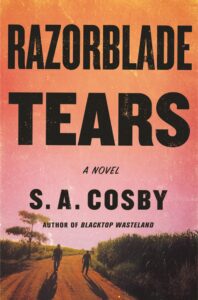
S.A. Cosby, Razorblade Tears
(Flatiron)
Cosby’s drive to expand the chorus of voices representing the South is on full display in his follow-up, Razorblade Tears … The novel’s DNA may seem familiar to readers of Blacktop Wasteland or Joe R. Lansdale’s Hap and Leonard series, but its composition feels utterly unique, as if the elements of one’s waking life were scrambled in a dream … Cosby has an unnerving ability to describe what fists, knives, guns and assorted garden implements can do to the human body, which may make the violence more vivid than some readers can abide. Riding shotgun with the violence, though, is also great beauty — in descriptions of the grief of a community, in the fathers’ stirring awareness of the true meaning of love and even in Cosby’s reverence for the vibrant natural world … The contradictions in Razorblade Tears suggest the deeper moral ambiguity in this and all vigilante narratives. Unlike another Shakespearean character, who famously said revenge is a dish best served cold, these Southern fathers are well aware of the paradoxes of their mission, even as they are compelled to finish it in the name of justice for their boys.”
–Paula L. Woods (Los Angeles Times)
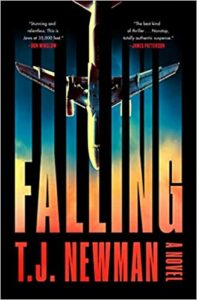
T.J. Newman, Falling
(Avid Reader / Simon and Schuster)
“… a smart airline thriller that is equal parts homage to the 1970s Airport film franchise and a 21st-century examination of failed American foreign policy … The plot’s construction is elevator-pitch gold … in a way, everyone is suspect, or at least complicit, when we learn that the terrorists here are Kurdish, and that they’re seeking revenge for being left to die when the Trump administration abandoned them in northern Syria. It’s a long haul to make terrorists empathetic, and to Newman’s credit, she doesn’t try. Instead, she merely tries to make them understandable. Revenge is a dish Americans love to consume, which makes Falling emotionally complex in surprising and refreshing ways … That’s not to say Falling doesn’t have its missteps—dialogue is not Newman’s specialty, so she ends up leaning into cliche … Still, Falling is expertly paced … a rich and assured debut.”
–Tod Goldberg (USA Today)
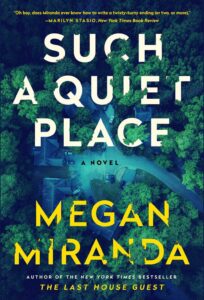
Megan Miranda, Such a Quiet Place
(Simon and Schuster)
Playing with perspective is a Miranda specialty, and she does so spectacularly in Such a Quiet Place, exploring how speculation can transform from idle entertainment to actual condemnation. She also touches on a favored theme of manipulative friendships, as Harper’s persistent self-doubt and empathetic nature leave her vulnerable, coloring her worldview and behavior toward Ruby … Miranda has created a claustrophobic and suspenseful whodunit—a pressure cooker brimming with a host of plausible suspects, toxic HOA groupthink and plenty of finger-pointing among supposed friends—that ponders the eternal question of how well we really know those closest to us.
–Linda M. Castellitto (Bookpage)
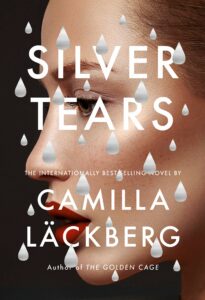
Camilla Lackberg (transl. Ian Giles), Silver Tears
(Knopf)
“[A] rip-roaring sequel … Läckberg intersperses Faye’s struggle to preserve Revenge and her secrets with scalding scenes from Faye’s youth in the town of Fjällbacka … This tribute to lusty sisterhood is a must for Scandi noir fans.”
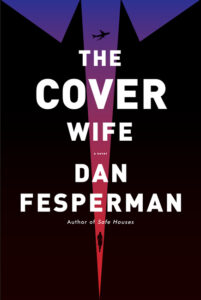
Dan Fesperman, The Cover Wife
(Knopf)
“The author specializes in humanizing the internecine turf battles between and within competing intelligence agencies. With The Cover Wife, he has produced another intelligent, tense and sharply written espionage thriller.”
–Tom Nolan (Wall Street Journal)
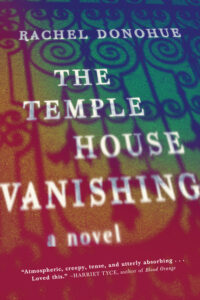
Rachel Donohue, The Temple House Vanishing
(Algonquin)
“… an evocation of gothic horror. While the dread never overwhelms, the sense that characters are haunted by what is happening at the school is felt from the moment that Louisa, the scholarship student, arrives … In an atmosphere where the cacophony of teenage hormones blares amid a community of nuns who have directed their passion toward the religious life, Donohue adds to the sense of shambolic emotions at play with skillful pacing. And as the wind sings through the cracks in the old windows, ghost stories are born.”
–Lorraine Berry (Star Tribune)
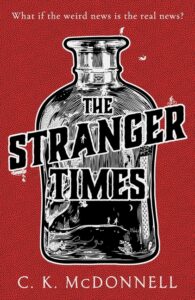
C.K. McDonnell, The Stranger Times
(Bantam)
“McDonnell packs jokes into every layer of his writing — narration, description, dialogue — and they always propel, rather than hold up, the business of storytelling, which is the real test of a comic author … He’s also got an enjoyable sense of the macabre; these dark forces are not messing around. There’s no disgrace in being formulaic when the formula is good, and The Stranger Times is ripping entertainment from start to finish.”
–Sarah Ditum (The Times UK)
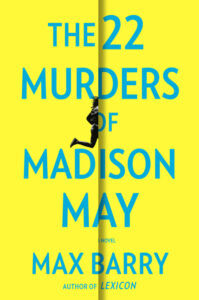
Max Barry, The 22 Murders of Madison May
(G.P. Putnam’s Sons)
“… a highly naturalistic and Earthbound milieu, but one with its own share of strangeness. The 22 Murders of Madison May begins with the intimate perspective of Madison ‘Maddie’ May … Her somewhat sad and depressive life is rendered with fine touches … We next jump into the daily grind of Felicity Staples, young political reporter for New York City’s Daily News. (Her vividly drawn co-workers, boss Brandon and crime beat maven Levi, stake out their roles nicely, too) … Barry strives to paint equally compelling portraits of the two women and comes pretty darn close. Each character assumes a fully rounded and weighty resonance. But Maddie’s condition as an unaware perennial victim militates against her foregrounding. It’s really Felicity who functions as our protagonist, as we witness her dogged, creative pursuit of justice, despite all the deracination she experiences.”
–Paul DiFilippo (Washington Post)
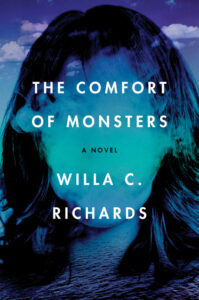
Willa C. Richards, The Comfort of Monsters
(Harper)
“[A] provocative debut … Her novel is absolutely thrilling. But it’s a slow unspooling that demands patience … Richards’s debut is so much bigger and smarter than simply just ‘the Dahmer novel’ … The Comfort of Monsters is an intense and artful examination of the relationships between sex, power, violence, and identity, as well as the deeply subjective nature of human memory. It’s a bravura performance by Richards that should demand readers’ attention.”
–Jung Yun (Los Angeles Review of Books)
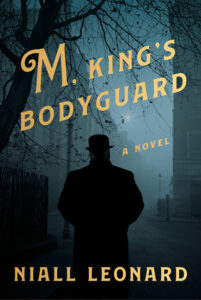
Niall Leonard, M. King’s Bodyguard
(Pantheon)
“… a well-paced, tightly plotted, deeply researched exercise that suggests the kind of family franchise one might actually want to keep reading … Leonard intelligently grounds the plot in the geopolitical paranoia of fin-de-siecle Europe, where anarchists have already claimed the lives of Alexander II of Russia, the Austrian Empress, and the prime minister of Spain, and where one tinder threatens to blow the whole chain of alliances sky high … In short, it’s all great fun … The research can sound awkward to the modern ear, and Melville’s Irish brogue can tilt to the vaudevillian…Meanwhile, the dead city, in its gorgeous squalor, lives.”
–Louis Bayard (The Washington Post)


















